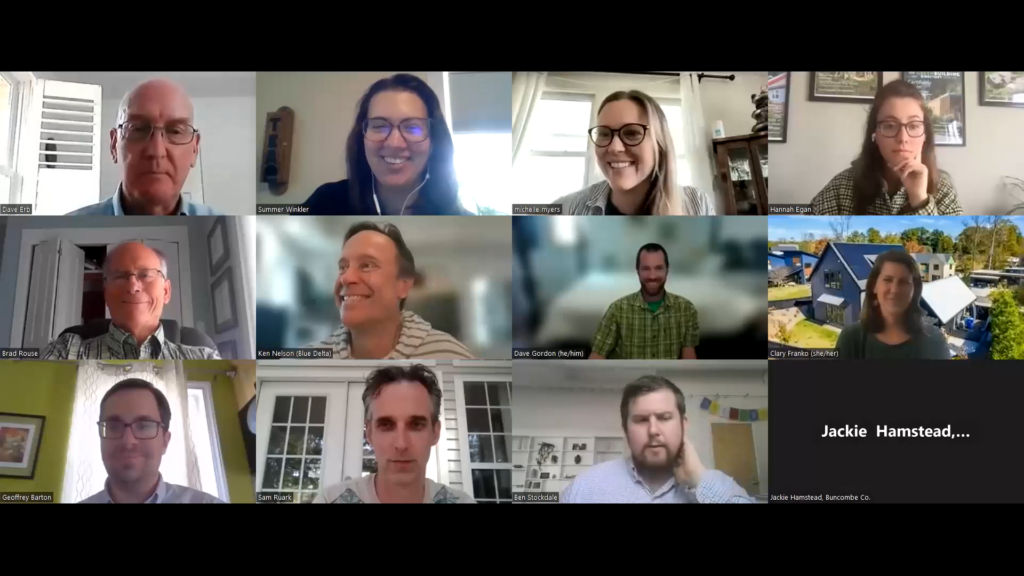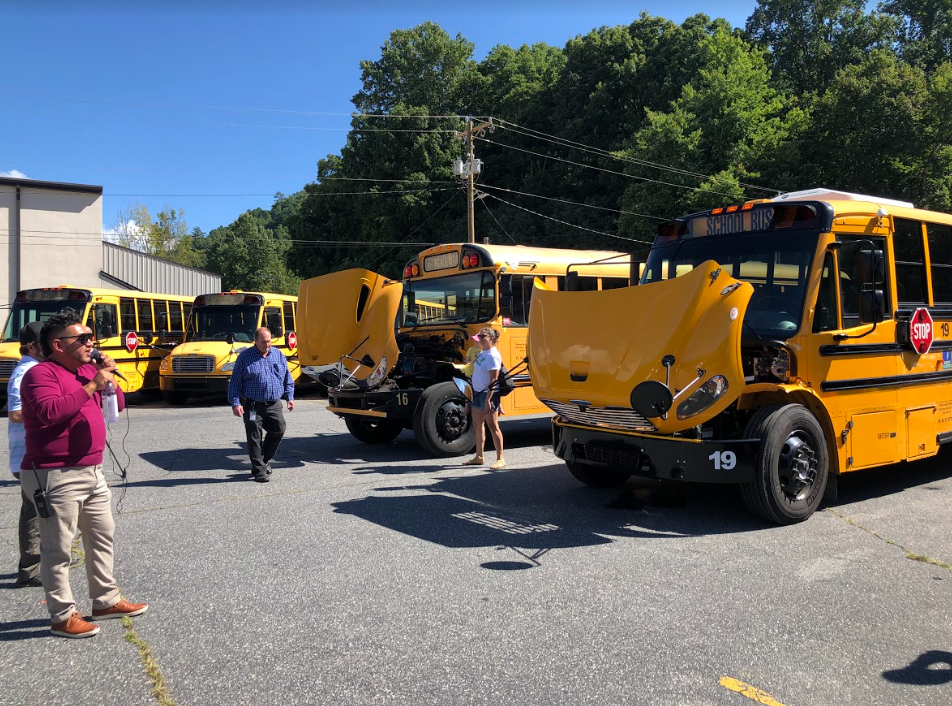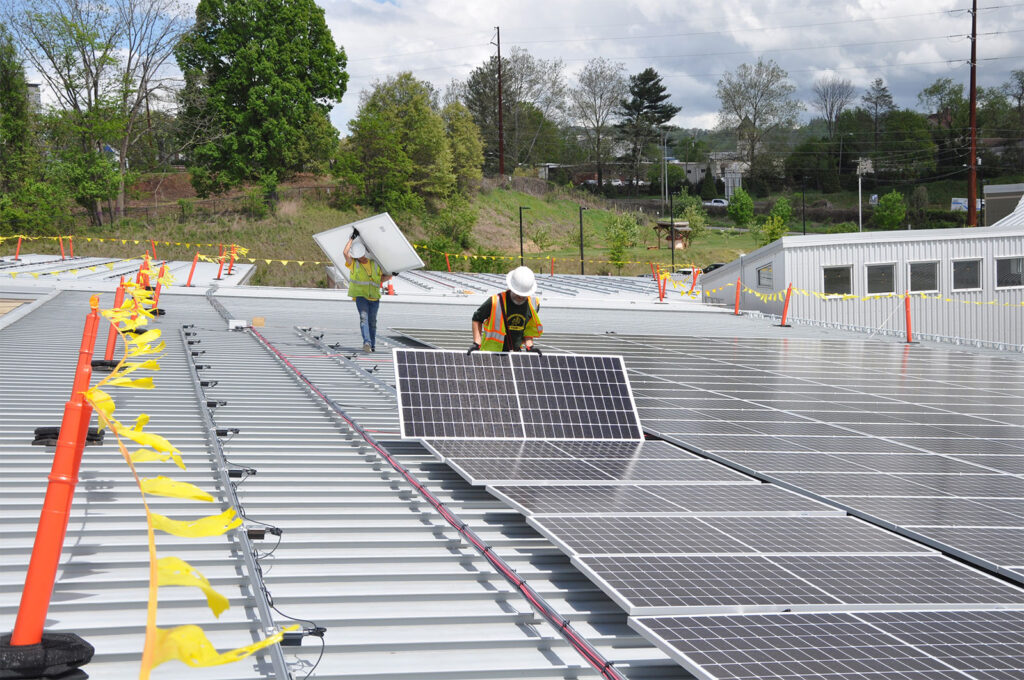Buncombe County, in collaboration with the City of Asheville, voted in 2017 to adopt a resolution for the county and community as a whole to be powered by 100% renewable energy by 2042. This is quite an ambitious goal, one that more and more cities, counties, and states are adopting by setting similar targets. In fact, according to the Clean Energy States Alliance, more than 51% of the U.S. population now lives in states that have 100% clean energy goals. This now includes North Carolina, which has set a goal for carbon neutrality in the electricity sector by 2050. But Buncombe County was way ahead of the state on this one, both in its time frame and its ambitions. Buncombe County, was the first community in Western North Carolina, and the second in the state, to commit to such a goal. And now, in collaboration with the Blue Horizons Project (BHP), Buncombe County is not merely focusing on clean energy in the electricity sector, but in ALL sectors.
Making lofty goals can be a great way to achieve high level success, but the devil is in the details. How in the world does an entire county, not just government operations — everyone and everything who resides within it — transition away from nearly 100% fossil fuels to run completely on renewable energy? Well, that’s where the Blue Horizons Project Community Council (BHPCC), a program of Green Built Alliance, comes into play. The BHPCC is the successor to the Energy Innovation Task Force (EITF), which successfully accomplished its first goal of blocking a new peaker energy plant at Lake Julian. With that accomplished, and under a new name, BHPCC, they set their sights on the goal of transitioning to a clean energy future in a just and equitable way.
In addition to its ongoing efforts to help equitably transition the community to clean energy, the BHPCC has worked for the past two years on creating a Strategic Plan detailing how to achieve its 100% renewable energy goals by 2042. The process has been incredibly collaborative and includes the input of over 100 community members who have contributed endless wisdom, insight, and expertise. The BHPCC and various committees and subcommittees have worked tirelessly to bring the plan to fruition.

The Blue Horizons Project Community Council meets monthly to strategize the path to 100% Renewable Energy. Photo courtesy of David Gordon.
It all started with the dream of a 100% renewable energy future. But what does that actually look like? After envisioning the future, the committee set upon understanding the current energy landscape of Buncombe County. In order to chart a path, we need to understand both where we are and where we want to go. At times, the process went thick into the weeds, trying to sort out all the nitty gritty details — things like geospatial boundaries, data analytics, energy units of measurement, and all the complex aspects of the energy sector. But as anyone who has ever hiked to a bald in order to get to a breathtaking Appalachian vista knows — you have to keep the end goal in mind, power through the burn, and keep trudging, step after step.
With all of the time, energy, and effort that went into the creation of the Strategic Plan, the BHPCC was proud to have a first draft completed at the end of February 2023. Following that, several rounds of reviews began, including reviews by a BIPOC led equity focus group, Green Built Alliance, the BHPCC, the City of Asheville and Buncombe County staff members, and various other external organizations. The review process is ongoing and the expected date for the final draft of the Strategic Plan is July 2023.
The process of creating the Strategic Plan has revealed many nuggets of wisdom that are worth sharing:
- Meeting the energy goal will be a community-wide effort beyond the control of any entity.
- Electrification and efficiency improvements can reduce the total energy required for the transition by about 50%.
- The BHPCC considered over 75 potential initiatives, and analyzed the 42 most relevant to our region to decide how best to focus on resources. The highest ranking initiatives include: heat pump water heater promotions and bulk buying, expanding the Energy Savers Network program, microgrids, working with HVAC contractors to electrify HVAC, promoting the expansion of EV charging infrastructure, agrivoltaics, expanding the Duke Multifamily Retrofit and DSM program, expanding the Duke Energy Small Business Energy Saver Program, the Neighbor to Neighbor Solar program, increasing walking and biking options, reducing vehicle miles traveled per capita, and focusing on opportunities for community action.
- Of the 42 potential initiatives analyzed, 12 have a ‘High’ favorability for equity impact.
- There are four local policies that can be implemented to help support the community moving towards its goals in a just and equitable way: incentivizing green development in new construction; improving permitting and inspections for cost savings and efficiencies; establishing staff positions at the City and County to provide a liason/ombudsman for developers and individuals to navigate the permitting process for renewable energy, energy efficiency, and electrification; and creating a financing structure to support the energy transition.
- State and federal policies can have a large impact on the ease in which the goals are achieved, so the BHP should engage in advocacy and organize community advocacy for state and federal policy change.
- Our current energy use is dominated by transportation fuels — which contribute around half — and electricity and natural gas each represent about one fourth of energy demand.
- Implementing the energy transition will require substantial capital investment, but the energy costs will be lower in the 100% renewable case than in the business as usual (BAU) scenario.
The community of Buncombe County has committed to a goal of 100% renewable energy by 2042. The Strategic Plan identifies the essential pathways of embracing energy efficiency, electrification, and greening the grid. Within these technical pathways, there are several recommendations on actions for entities to take.

However, the key strategy across the board is to take a whole systems approach that incorporates: (1) initiatives to be implemented, (2) policy changes to be implemented or supported, and (3) community engagement. If these three areas of action are integrated into every step and decision made within our community, we believe that Buncombe County can and will successfully achieve its goal of 100% renewable energy by 2042 in a manner that is just, equitable, and benefits all members of our local, national, and global community. The time to act is now.
Learn how you can play a role in making this dream a reality at bluehorizonsproject.com/renewableplan or donate to the Clean Energy Dream Campaign here.
David Gordon, M.S. Sustainability Studies from LRU, grew up in Oakland, CA. He has worked as a Teacher, Naturalist, Backcountry Guide, CiviCorps Crew Leader, Park Ranger, Green Builder, and currently works as a Project Management consultant with the Blue Horizons Project at Green Built Alliance.


